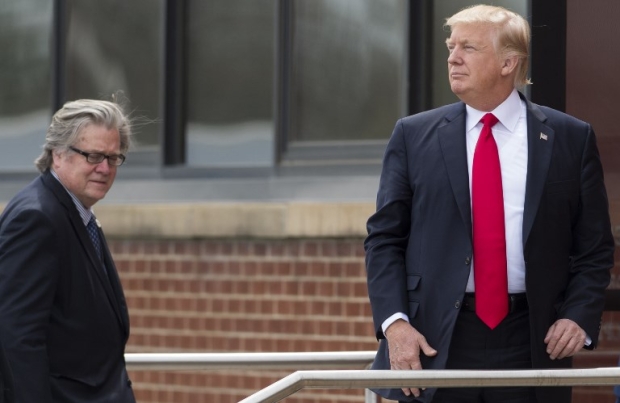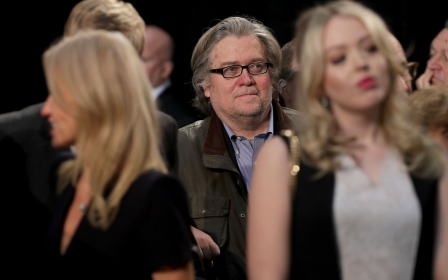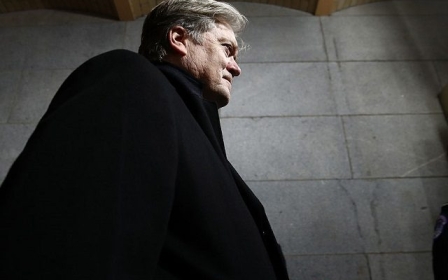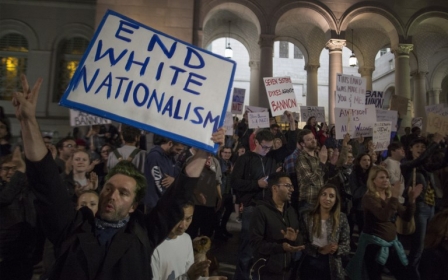Steve Bannon's Europe tour: When fascists attack, we fight back
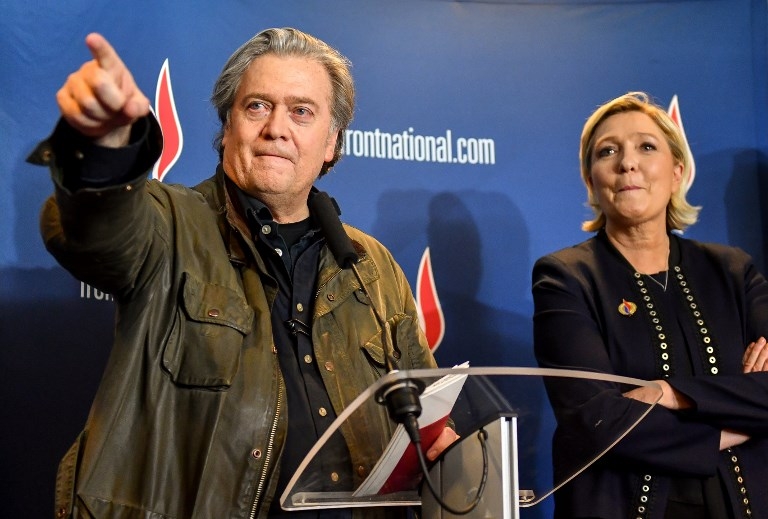
Much to many people's dismay, Steve Bannon - Trump's former chief strategist, and one of the main actors to blame for his election victory - has been touring Europe in recent weeks, forging what he effectively hopes to be a transatlantic alt-right alliance.
It seems that his expulsion from the White House, and even from the online platform he created, Breitbart, were not enough to dissuade nationalist groups and figures of all stripes - from Switzerland to France - from rolling out the red carpet for Bannon.
The message from Westminster, Paris, Washington and Moscow is clear: Don't blame politicians, bosses or bankers - turn against racialised communities instead. Fear Muslims. Hate immigrants. Attack black and Asian people
Perhaps these rejections by "the establishment" even strengthened his appeal among the collection of white supremacists, fascists and racist groups he hopes to unify. It wouldn't be surprising if he was considered "brave" and somewhat of a martyr for having held on to his views in the face of institutional pressure within the far-right spaces he frequented.
'Let them call you racists'
His journey started with Italy, celebrating the success of so-called anti-establishment parties that were once upon a time relegated to the periphery of Italian politics. In particular, Bannon celebrated the seats won by the far-right Northern League.
Bannon then went on to a speaking engagement at a nationalist rally in Zurich organised by Swiss magazine Die Weltwoche. There, he described the rise of the far-right across the West as a "movement", and attempted to empower the crowd by stating (or rather warning): "It's just beginning. The tide of history is on our side."
On immigration, he demonstrated his utter disregard for the impacts of slavery, colonialism and ongoing Western political and economic intervention in the global south, noting: "The problems of sub-Saharan Africa and northern Africa have to be sorted out in sub-Saharan Africa and northern Africa."
Far from standing up to the elites of the world, Bannon and company instead serve as their attack dogs and most servile lackeys
He also praised as a "hero" anti-migrant Hungarian Prime Minister Viktor Orban, who has actively mobilised xenophobic and Islamophobic hate in Hungary and accused any institution that seeks to protect refugees of being complicit with "the decline of Christian culture and the advance of Islam".
Given that Bannon was the self-declared mastermind of the Trump administration's Muslim ban, one can see where the admiration for Orban comes from. Bannon also managed to squeeze in a meeting with Alice Weidel of the far-right Alternative for Germany party, before heading to France.
In Lille, he gave a keynote speech at the National Front's annual congress, where he addressed attendees as though he was delivering an anti-bullying workshop - an approach in line with the far-right's perception of facing down the establishment amid oppression by the elite.
Bannon confidently told attendees: "You fight for your country and they call you racist, but the days when those kind of insults work is over. The establishment media are the dogs of the system. Every day, we become stronger and they become weaker. Let them call you racists, xenophobes or whatever else; wear these like a medal."
A worldwide crisis
The fact that the same conference discussed changing its name to Rassemblemant National - a direct reference to the party of the same name set up during WWII that openly collaborated with the Nazis - points to the fact that Bannon is not alone in wearing his racism as a badge of honour.
The time when fascists and far-right organisations strove to hide under a cloak of respectability is fast drawing to a close.
French human rights activist Yasser Louati said the visit underscored "the transatlantic cooperation between American- and European-based fascist networks".
In France, it marked the National Front's "return to blatant racism after 15 years of constant efforts to seek respectability. This is not to be taken lightly … Now that the brain that contributed to bring Donald Trump to power in the US has joined forces with both Marine Le Pen and her niece … the emergence of an integrated Islamophobic network is a reality, not a conspiracy theory."
Bannon understands this and is putting all his resources, through various platforms, to forge a link between racist groups around the world. He interprets political wins as a sign that they are winning more than just seats of power; they are turning hearts and minds.
The situation has reached a boiling point. Far from standing up to the elites of the world, Bannon and company instead serve as their attack dogs and most servile lackeys. While the economic crisis of 2008 was weathered, overall, by the world's leading powers, the underlying triple crisis of productivity, employment and legitimacy has not gone anywhere.
The system is in crisis and the elite's response has been to whip up racism - primarily against migrants and Muslims. The message from Westminster, Paris and Washington, to New Delhi, Pretoria and Moscow is clear: Don't blame politicians, bosses or bankers - turn against racialised communities instead. Fear Muslims. Hate immigrants. Attack black and Asian people.
Mobilising grassroots resistance
In this sense, the partnership between Bannon and Trump was a perfect image for the current global trend: a millionaire businessman in control of the most powerful state in the world, protected by his racist attack dog, charged with encouraging the population to look the other way.
But there is also an alternative path. The only suitable response to this - and the only way we will ever be successful in reversing the effects of the alt-right - is to mobilise grassroots resistance and build our own transatlantic network.
We have witnessed the power of solidarity in the UK with the Women's March on Washington and in response to Trump's Muslim ban, but our efforts must go further and translate into action. Pressure has the power to reverse oppressive policies.
In the UK, the bases for resistance are visible everywhere. From anti-Prevent action in universities and schools, to migrant solidarity initiatives like that of the Stansted 15, to the hunger strike by women in Yarl's Wood Immigration Removal Centre, resistance is crystallising and people are organising in response to the growing tide of racism and repression.
We have been here before. In the 1930s and 1970s, large fascist mobilisations hit the UK under the leadership of the British Union of Fascists and the National Front respectively. Then, like now, they enjoyed large support among the British establishment, which saw them as an important counterweight to those who pointed fingers at the establishment.
'We fight them back'
In the 1930s, a broad alliance of Jewish communities, trade unionists, communists, socialists, Labour Party members and anti-racists faced down the British Union of Fascists in east London and defeated them both on the streets and in the hearts and minds of the population.
Similarly, in the face of the National Front rise in the 1970s, organisations such as the Asian Youth Movements, the Anti-Nazi League, Rock Against Racism and others challenged racism in the streets and in the cultural realm.
But history can only ever be an example; the proof of the pudding will be in the eating. Will our generation manage to bring together the different anti-racist organisations, targeted communities, students and trade unions, and forge a broad societal alliance that can push back the tide of reaction?
This is the task at hand. Indeed, in the words of the famous British-Jamaican singer, Linton Kwesi Johnson: "When fascists are on the attack, we fight them back."
- Malia Bouattia is an activist, the former President of the National Union of Students, co-founder of the Students not Suspects/Educators not Informants Network and presenter/panelist on British Muslim TV's Women Like Us.
The views expressed in this article belong to the author and do not necessarily reflect the editorial policy of Middle East Eye.
Photo: Former US presidential adviser Steve Bannon gestures as he stands next to France's far-right National Front president Marine Le Pen after giving a speech during the party's annual congress on 10 March 2018 in Lille, northern France (AFP)
New MEE newsletter: Jerusalem Dispatch
Sign up to get the latest insights and analysis on Israel-Palestine, alongside Turkey Unpacked and other MEE newsletters
Middle East Eye delivers independent and unrivalled coverage and analysis of the Middle East, North Africa and beyond. To learn more about republishing this content and the associated fees, please fill out this form. More about MEE can be found here.



